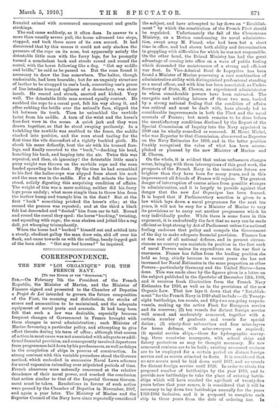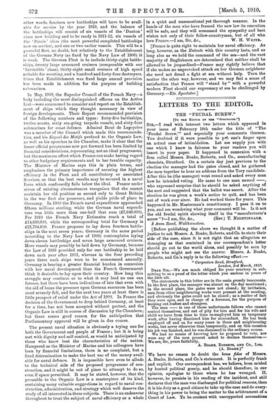CORRESPONDENCE.
THE NEW " LOI ORGANIQUE " FOR THE FRENCH NAVY.
[TO THE EDITOR OF THE " EPECTATOR."1 SIR,—On February 7th the President of the French Republic, the Minister of Marine, and the Minister of Finance signed and presented to the Chamber of Deputies a Projet de Loi intended to govern the future composition of the Fleet, its manning and distribution, the stocks of stores and ammunition to be maintained, and the adequate equipment of naval ports and arsenals. It had long been felt that such a law was desirable, especially because frequent changes of Government in France brought with them changes in naval administration ; each Minister of Marine favouring a particular policy, and attempting to give effect thereto during his term of office ; although that course of action in most cases was not associated with adequate or addi- tional financial provision, and consequently involved departures from programmes laid down by his predecessors, as well as delays in the completion of ships in process of construction. In strong contrast with this variable procedure stood the German method, which embodied in successive Naval Laws schemes for naval expansion extending over stipulated periods of time. French observers were naturally concerned at the relative decadence of their naval power, and reached the conclusion that action similar to that of the Imperial German Govern- ment must be taken. Resolutions in favour of such action were passed by the Chamber of Deputies in November, 1907, and again a year later. The Ministry of Marine and the Superior Council of the Navy have since repeatedly considered
the subject, and have attempted to lay down an " Establish- ment " by which the constitution of the French Fleet should be regulated. Unfortunately the fall of the Clemenceau Ministry, on a Motion condemning its naval administra- tion, swept away M. Picard, who had been but a short time in office, and had shown both ability and determination in grappling with difficulties for which he was not responsible. On the other hand, the Briand Ministry has had the great advantage of coming into office on a wave of public feeling which demanded the maintenance of a strong and efficient war fleet. In Vice-Admiral Bou6 de LapeyrCre has been found a Minister of Marine possessing a rare combination of administrative ability with distinguished professional standing as a naval officer, and with him has been associated, as Under- Secretary of State, M. Cheron, an experienced administrator to whom considerable powers have been entrusted. The energetic and untiring labours of these two men, backed by a strong national feeling that the condition of affairs was critical and must be dealt with, have already led to considerable improvements in both the Fleet and the naval arsenals of France ; but much remains to be done before the unsatisfactory conditions disclosed by the Report of the Special Commission of Inquiry into the Navy appointed in 1909 can be wholly remedied or removed. M. Henri Michel, who was Reporter to that Commission, also served as Reporter on the Navy Estimates for 1910, and in the latter position frankly recognised the value of what has been accom- plished or planned by the new Minister of Marine and M. Cheron.
On the whole, it is evident that unless unforeseen changes occur, bringing with them interruptions of this good work, the prospects of the French Navy in the immediate future are brighter than they have been for many years, and in this improvement all friends of France will rejoice. The greatest danger of interruption of course arises from possible changes in administration, and it is largely to provide against that danger that the new Loi Organique has been framed. It is hoped that if Parliamentary sanction is given to a law which lays down a naval programme for the next ten years, it will not be easy for a Minister of Marine to vary its provisions or to carry out another programme which he may individually prefer. While there is some force in this argument, it is undoubtedly the fact that no navy can be made efficient or kept strong by Act of Parliament unless the national feeling endorses that policy and compels the Government of the day to make adequate financial provision. Finance lies at the root of all national defence, and in present circum- stances no country can maintain its position in the first rank of naval Powers unless its expenditure on the war fleet, is enormous. France has fallen from the leading position she held so long, chiefly because in recent years she has not increased her Naval Estimates in the same proportion as other Powers—particularly Germany and the United States—have done. This was made clear by the figures given in a letter on the subject published in the Spectator of December 12th, 1908, and it receives fresh illustration from the French Navy Estimates for 1910, as well as in the provisions of the new Organic Law. That law lays it down that the " Establish- ment "for the French Navy in 1919 shall include :—(1) Twenty- eight battleships, ten scouts, and fifty-two sea-going torpedo- vessels, making up the active Fleet for European service and its reserves ; (2) ten vessels for distant foreign service well armed and moderately armoured, together with a certain number of gunboats and vessels for special duties ; (3) ninety-four submarines and four mine-layers for home defence, with mine-sweepers as required ; (4) special service ships,—three for bydrographic survey- ing, three coastwise transports, with school ships and fishery protectors as may be thought necessary. No new armoured cruisers are to be built; existing armoured cruisers are to be employed for a certain period on distant foreign service and as scouts attached to fleets. It is considered that no new scouts need be laid down until 1917, and no vessels for distant foreign service until 1920. In order to attain the proposed number of battleships by the year 1919, and to provide new battleships to take the place of existing battle- ships which will have reached the age-limit of twenty-five years before that year comes, it is considered that it will be necessary to lay down two battleships annually for the years 1910-1916 inclusive, and it is proposed to complete each ship in three years from the date of ordering her. In
other words, fourteen new battleships will have to be avail- ab1.e for service by the year 1919, and the balance of the battleships will consist of six vessels of the Denton' class now building and to be ready in 1911-12, six vessels of the Petrie' class (the most powerful completed battleships now on service), and one or two earlier vessels. This will be a powerful fleet, no doubt, but relatively to the Establishment of the German Navy (as fixed by the Navy Law of 1908) it is weak. The German Fleet is to include thirty-eight battle- ships, twenty large armoured cruisers (comparable with our ' Invincible' class), thirty-eight small cruisers of high speed suitable for scouting, and a hundred and forty-four destroyers. Since that Establishment was fixed large annual provision has been made in addition for the purpose of building submarines.
In May, 1909, the Superior Council of the French Navy—a body including the most distinguished officers on the Active List—were summoned to consider and report on the Establish- ment of ships which they thought necessary in view of foreign developments. Their Report recommended provision of the following numbers and types: forty-five battleships, twelve scouts, sixty sea-going torpedo vessels, and sixty-four submarines for coast defence. Admiral Bond de Lapeyrere was a member of the Council which made this recommenda- tion, and his Exposi des Motifs prefixed to the Organic Law, as well as his speeches in the Chamber, make it clear that the lesser official programme now put forward has been limited by financial considerations, representing, not an ideal programme, but the maximum effort which France can make having regard to other budgetary requirements and to her taxable capacity. The Minister of Marine says this in plain terms, and emphasises the primary importance of securing the highest efficiency in the Fleet and all contributory or associated Services, so that the best results may be secured in a naval force which confessedly falls below the ideal. France under stress of existing circumstances recognises that she cannot maintain her old position as second only to Great Britain in the war fleet she possesses, and yields pride of place to Germany. In 1900 the French naval expenditure approached fifteen millions sterling, while the German naval expendi- ture was little more than one-half that sum (27,619,000). For 1910 the French Navy Estimates reach a total of £14,860,000, while the corresponding total for Germany is £21,704,000. France proposes to lay down fourteen battle- ships in the next seven years; Germany in the same period (according to the Navy Law of 1908) contemplates laying down eleven battleships and seven large armoured cruisers. More vessels may possibly be laid down by Germany, because the Law of 1908 provided only for one battleship to be laid down each year after 1911, whereas in the four preceding years three such ships were to be commenced annually. Germany is bearing a greater financial burden in connexion with her naval development than the French Government think it desirable to lay upon their country. How long this struggle may continue or to what it may lead no one can foresee, but there have been indications of late that even with the aid of loans the pressure upon German resources has been most severely felt, and for the next two years at least there is little prospect of relief under the Act of 1903. In France the decision of the Government to drop behind Germany, at least for a time, has not been accepted without protest, and the Organic Law is still in course of discussion by the Chambers; but there seems good reason for the anticipation that Parliamentary approval will be given in due course.
The present naval situation is obviously a trying one for both the Government and people of France ; but it is being met with dignity and self-control, as would be anticipated by those who know best the characteristics of the nation. Hampered as the Minister of Marine and his colleagues have been by financial limitations, there is no complaint, but a fixed determination to make the best use of the money avail- able for naval defence. It is impossible here even to allude to the technical side of the proposed programme of con- struction, and it might be out of place to attempt to do so, even if space permitted. It may be stated, however, that the preamble to the Organic Law is a masterpiece of its kind, containing many valuable suggestions in regard to naval con- struction, administration, and strategy which well deserve the study of all interested in these subjects. There is an endeavour throughout to treat the subject of naval efficiency as a whole
in a quiet and =sensational yet thorough manner. In the hands of the men who have framed the new law its execution will be safe, and they will command the sympathy and best wishes not only of their fellow-countrymen, but of all who
{France is quite right to maintain her naval efficiency. As long, however, as the Entente with this country lasts, and as long also as we hold the command of the sea—and the vast majority of Englishmen are determined that neither shall be allowed to be jeopardised—France may rightly believe that if she makes no unprovoked attack on her German neighbour she need not dread a fight at sea without help. Turn the matter the other way, however, and we may feel a sense of satisfaction that France will " stand by " with a powerful modern Fleet should our supremacy at sea be challenged by Germany.—En. Spectator.]















































 Previous page
Previous page